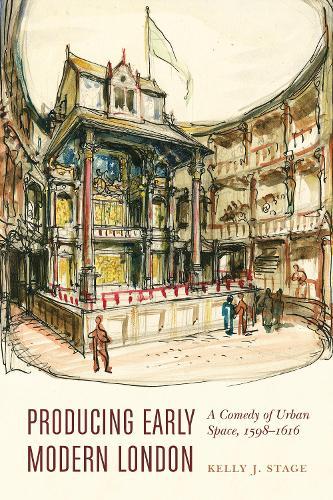Overview
Early seventeenth-century London playwrights used actual locations in their comedies while simultaneously exploring London as an imagined, ephemeral, urban space. Producing Early Modern London examines this tension between representing place and producing urban space. In analyzing the theater's use of city spaces and places, Kelly J. Stage shows how the satirical comedies of the early seventeenth century came to embody the city as the city embodied the plays. Stage focuses on city plays by George Chapman, Thomas Dekker, William Haughton, Ben Jonson, John Marston, Thomas Middleton, and John Webster. While the conventional labels of ""city comedy"" or ""citizen comedy"" have often been applied to these plays, she argues that London comedies defy these genre categorizations because the ruptures, expansions, conflicts, and imperfections of the expanding city became a part of their form. Rather than defining the ""city comedy,"" comedy in this period proved to be the genre of London. As the expansion of London's social space exceeded the strict confines of the ""square mile,"" the city burgeoned into a new metropolis. The satiric comedies of this period became, in effect, playgrounds for urban experimentation. Early seventeenth-century playwrights seized the opportunity to explore the myriad ways in which London worked, taking the expected-a romance plot, a typical father-son conflict, a cross-dressing intrigue-and turning it into a multifaceted, complex story of interaction and proximity.
Full Product Details
Author: Kelly J. Stage
Publisher: University of Nebraska Press
Imprint: University of Nebraska Press
ISBN: 9781496201812
ISBN 10: 1496201817
Pages: 277
Publication Date: 01 January 2018
Audience:
Professional and scholarly
,
Professional & Vocational
Format: Hardback
Publisher's Status: Active
Availability: In Print

This item will be ordered in for you from one of our suppliers. Upon receipt, we will promptly dispatch it out to you. For in store availability, please contact us.
Reviews
Kelly Stage's excellent and focused close reading of plays is characteristically insightful, compelling, and provocative while simultaneously illustrating her key thesis about the existential `dual gaze' required by this specific genre of comedy. -Steven Mullaney, professor of English at the University of Michigan and author of The Reformation of Emotions in the Age of Shakespeare -- Steven Mullaney
Many of these case studies will be important reading for future scholars looking to continue the work of mapping the territory of the city comedy. -Matteo Pangallo, Early Theatre -- Matteo Pangallo * Early Theatre * In the elegance of its critical formulations carefully applied to the close reading of key works in the city-comedy canon, this is an astute and important book that makes a signi?cant contribution to understanding the placemaking of early modern London drama. -Andrew Gordon, Renaissance Quarterly -- Andrew Gordon * Renaissance Quarterly * Kelly Stage's excellent and focused close reading of plays is characteristically insightful, compelling, and provocative while simultaneously illustrating her key thesis about the existential 'dual gaze' required by this specific genre of comedy. -Steven Mullaney, professor of English at the University of Michigan and author of The Reformation of Emotions in the Age of Shakespeare -- Steven Mullaney
“Kelly Stage’s excellent and focused close reading of plays is characteristically insightful, compelling, and provocative while simultaneously illustrating her key thesis about the existential ‘dual gaze’ required by this specific genre of comedy.”—Steven Mullaney, professor of English at the University of Michigan and author of The Reformation of Emotions in the Age of Shakespeare
Author Information
Kelly J. Stage is an assistant professor in the department of English at the University of Nebraska–Lincoln.




